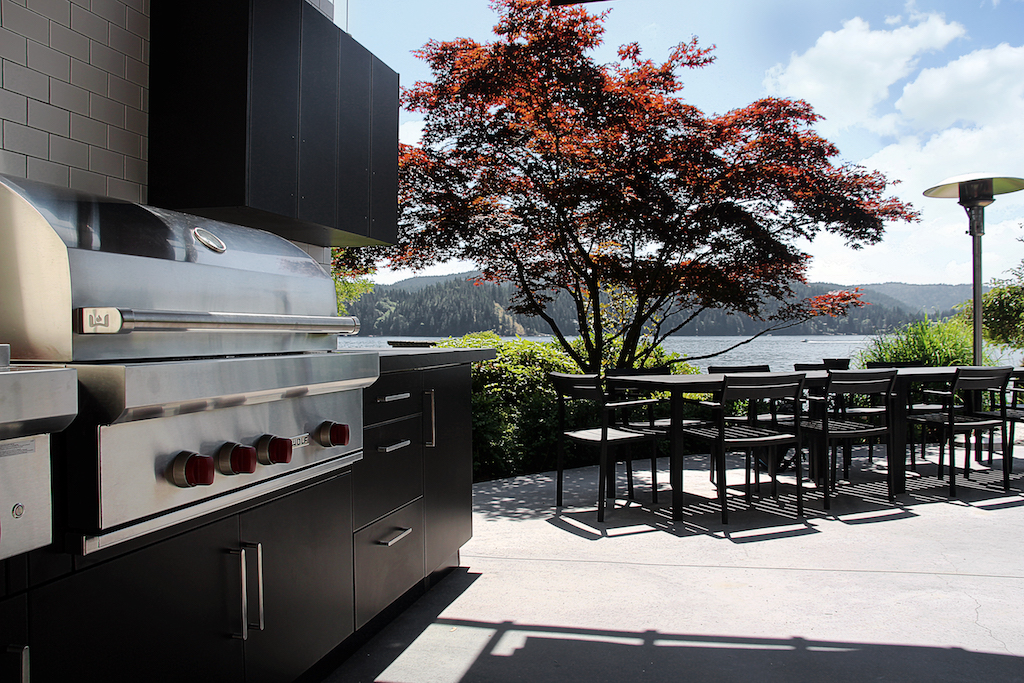To choose among outdoor kitchen material options, it is important for the outdoor cabinet material to have minimal maintenance and durability in virtually every climate. Of the most popular materials, metal is the best choice for outdoor kitchens, as it is long-lasting and can be customized with a powder coat finish that is attractive and virtually free of maintenance. In this article, we compare the two most popular metals for outdoor kitchen cabinets – aluminum and stainless steel.
Aluminum Cabinets
Aluminum cabinets can last a long time in the outdoors because the lack of iron content in aluminum prevents it from rusting. The surface of an aluminum cabinet is not free of maintenance though, as it can still corrode. While aluminum can be long-lasting in this respect, this material possesses other properties that must be considered when it is used for outdoor kitchen cabinets. For example, it is soft, lightweight, a good conductor for heat, and it has a lower melting point than other metals that contain iron. These qualities mean aluminum outdoor kitchen cabinets are susceptible to denting, and it tends to be a less workable material for grill cabinets and cooktops where heat is a concern.
Stainless Steel Cabinets
Stainless steel is a very popular material for outdoor kitchen cabinets. It is an alloy composed of iron and at least 10.5% chromium. The presence of chromium is vital, as it deters the stainless steel from rusting, and it is an important element to note if you’ve been wondering: does stainless steel rust? Stainless steel is also available in a variety of grades which are useful in different applications. The most common grades of stainless steel kitchen cabinets are 304 and 316 (marine grade), with 316 providing added resistance to corrosion. Although a bare stainless steel cabinet is an appealing option for an outdoor kitchen design and outdoor living space, it must be properly maintained and regularly cleaned to avoid rust, corrosion, scratches, or stains.
Which Metal is Better?
In determining which metal is a better choice for your outdoor living space or any modular outdoor kitchens, it is very important to factor in features such as durability and structural integrity; ability to withstand weather effects, heat, and everyday wear and tear; weight and density; aesthetics; and longevity in the outdoors. These factors are vital because outdoor kitchen cabinets are susceptible to potentially harmful effects from weather and simply normal use. Aluminum and stainless steel are both comparable in terms of longevity in the outdoors and aesthetics. However, when looking at the differences, stainless steel is the better outdoor kitchen cabinet material due to durability, structural integrity, and ability to withstand heat and other effects of outdoor cooking.
As discussed, bare aluminum can corrode, and stainless steel can rust in the outdoors. Both metals must be maintained to prevent rust and/or corrosion with regular cleaning and covering when not in use. To reduce maintenance to a bare minimum and provide an attractive finish, the stainless steel cabinets manufactured by Brown Jordan Outdoor Kitchens can be powder coated in a variety of colors, textures, and metallics that are UV resistant. Aluminum outdoor kitchen cabinets can have powder coating as well, meaning that both metal surfaces require similar maintenance.
Outdoor kitchen cabinets should be able to withstand weather effects and everyday wear and tear of outdoor cooking. Stainless steel is both heavier and denser than aluminum, which are two properties that are key for durability. Since aluminum is soft, structural integrity is a potential concern. Aluminum cabinets are susceptible to denting during use or during inclement weather. The last thing you want to worry about is a dented cabinet door, which is not only unsightly but can affect how the door opens and closes.
One of the main purposes of outdoor kitchens is the ability to cook in the outdoors. As such, outdoor cabinetry should be able to handle heat. Aluminum has a higher conductivity for heat and a lower melting point than stainless steel. These properties mean that aluminum absorbs heat very easily and can become too hot to touch, lose strength, or even warp over time when exposed to cooking temperatures (400-600 degrees F), which renders it a less viable option for grill cabinets and cooktops. On the contrary, the 304 and 316 grades of stainless steel used for outdoor kitchen cabinets are very resistant to heat and there is no concern for heat-related effects.
The Best Option
While both aluminum and stainless steel can be used for outdoor kitchen cabinets, stainless steel is the better choice for your outdoor space. Its durable nature and ability to withstand heat and other effects will ensure that your new outdoor kitchen cabinets and storage space will maintain structural integrity and offer plenty of use for years to come. Brown Jordan Outdoor Kitchens are designed for luxury and timeless enjoyment. Get in touch today to learn more about our outdoor cabinetry to transform your entertaining area and storage space outdoors.

